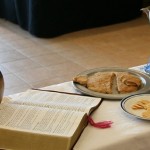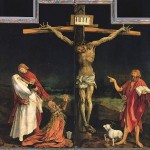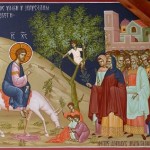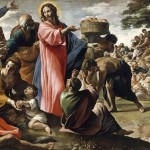 All of this talk about eating the flesh and drinking the blood of Jesus is making my head hurt and my heart ache!
All of this talk about eating the flesh and drinking the blood of Jesus is making my head hurt and my heart ache!
“This is a hard saying; who can understand it!”
John 6 gets to the heart of the Gospel because it gets to the heart of Jesus Christ.
In this last part of John 6 the mystery is more about the Spirit and the Word, while previously it was about flesh and bread.
“The words that I speak to you are spirit, and they are life” (verse 63). What an extraordinary claim! And how mysterious are the word and The Word! Who can understand them? Words are mysterious things. Only their ubiquity makes them seem ordinary. But if you only stop to meditate on words and language, strange and wonderful things happen.
Have you ever had the experience of looking at a word that you’ve seen all your life when suddenly it becomes weird and mysterious? For example, the word “scissors.” We all know that the letters S,C,I,S,S,O,R, and S, when spelled in succession spell “scissors.” But they don’t really spell “siz-ers,” do they? They spell “skiz-ers.” I’m sure you have noticed this same disorienting phenomenon with letters and words.
This phenomenon is exactly what God wants to happen to us with Him. He wants us to both engage Him and draw near and know Him and yet understand that He who is not us has come to be with us.
Once again, we are faced with twin dangers of idolatry and atheism. Both are responses to the mystery that is God that are false and foolish.
If we ever let the Word of God, both Bible and Christ become too ordinary then we have begun the idolatrous process of taming God and making Him too familiar. God, through the Word and Spirit, is very close to us, indeed, and He has become our brother and dwells within us. And yet He remains God, so terribly far above us that we dare not think we have comprehended Him in full.
And then there is the modern delusion known as “deconstruction,” a corrupt philosophy that is atheistic to the core and most commonly taught in English departments in the very classes that are to seek understanding through the literature of the word. Deconstruction begins with the belief that words are entirely human and arbitrary things and that there is no necessary connection between the word and the thing signified. Therefore, when interpreting literature (including the Bible) we are always misinterpreting the meaning, and there is no fixed, universal meaning, just as in postmodernism there is no metanarrative which makes sense of things for all.
Man without God is therefore either as an idolater or an atheist.
And none of us is completely immune from these dread diseases of the soul.
The word and Word remain mysterious. How is it that seemingly arbitrary splotches of ink on a page communicate the meaning of life, the universe, and everything? And yet they do. If you are reading Daily Bread on your computer think of the miraculous transformation that has taken place. I, Fr. Charles, read the Word of God. This in itself is a major miracle. Consider what is involved. I read my physical Bible that is before me, but where did it come from? It was printed by Thomas Nelson in Nashville, Tennessee (I’m looking at my New King James Version [and if you want to know something truly strange, consider how it’s possible to copyright the Word of God in a particular format!]) A team of scholars decided to look at the King James Version of the Bible and consult texts of the Bible discovered after 1611 to revise the KJV. Those original scholars also consulted the manuscripts they had, working off the Tyndale and other versions of the Bible. The manuscripts consulted are themselves copies of copies of the original text. The original text itself was almost certainly revised and edited by the Church. Behind this original text or texts lies the oral word, for example, the oral teaching of Jesus found in John 6 and remembered by John. Jesus Himself, of course, had to actually speak these words in the first place, and so He had to have a body that was designed with physical speech in mind, a body that had to be connected to a brain, a mind, and a spirit. Of course this particular body was united to the Godhead Himself. The Word made flesh spoke the words of John 6 that I, Fr. Charles, have read this morning. And so the mystery of The Word made words made Give Us This Day begins with the mystery of the Incarnation.
Now what happens after Fr. Charles reads John 6? More miracles!
I read the ink that Thomas Nelson has spilled on page 1773 of my Bible, and all that has gone into the production of those words (see the above long paragraph) comes into play. And then my body, mind, and spirit engage with the words I see, becoming one with my experience, as the Word of God Himself, through the Holy Spirit, comes to me and I feed off Him. As this mystical union takes place, even as I remain me and God remains God, I am inspired (not in the same sense as Scripture is inspired) to think, feel, and meditate on certain truths God communicates to me. My thoughts, feelings, and experiences mingle together, and I make choices to say certain things to you. From my heart to my mind to my fingers come the words that you are now reading. My words mingle with your own reading of the Word of God that has come to you as well. And hopefully you are inspired to meditate on God’s Word and worship Him as well.
Talk about mystery!
Notice how in all of this body and spirit, the physical and the immaterial, paper and words, God and man, are all coming together? It is the Incarnation at work in a powerful way. Who can understand such mysteries? And yet we do.
It is the sacramental principle at work, by which God, having been made man, speaks to us through the flesh of His creation. In this way, the Bible itself is a kind of lesser sacrament, as is the whole world. We have access to God through the Son and the Spirit who present themselves to us through the Word of God made human words and through the bread and wine through which the Body and Blood of Christ come to us. Maybe now we can understand the Sacrament, as well as prayer and the Bible a little better.
Of course all of this is foolishness to man, and it’s no wonder that men ever since John 6 have been walking away from God and His foolishly mysterious way of coming to man.
So God comes to us in ways that we both understand and yet don’t comprehend, and what shall we do? Shall we walk away when God and words and even life seem confusing? You may have noticed that life itself is another mystery, akin to the mystery of God made man, the Bible, and the Sacraments. It makes sense, and yet it does not.
But where else shall we go when things don’t quite make sense and seem too big for us? What is your response to God when things don’t make sense? Do you turn away, even a little, or do you embrace Him all the more? We don’t usually turn away from God all at once, but we practice turning from Him a little at a time. Often we do this because life doesn’t make sense.
Right now I am experiencing a time in my life when things don’t make sense. I’m exceptionally tired, even for me. The brain and body fog that have descended upon me (I think it’s largely due to allergies, the body turning against itself [thank you Adam and Eve!]), and I can’t seem to feel God or connect to Him the way that I’d like to. The spirit is willing but the flesh is weak and wears a protective armor, as if lead shielding Superman’s eyes from penetrating.
How shall I respond? Shall I trudge on as if God doesn’t exist because I can’t quite feel Him. Shall I act unilaterally as if He doesn’t exist because I can’t feel Him? Do I really want to act like a spiritual toddler, believing that God isn’t here and can’t see me, just because I’m under a blanket and can’t see Him?
Where shall I go and what shall I do?
Lord, to whom shall I go? I have left all else for you. I am the cartoon character who has walked off the edge of the cliff, and there’s no way but down unless your grace intervenes.
You, Jesus, have the words of life. You are the Word of Life!
I believe! Help my unbelief!
I come to you, bearing the cross of confusion and finitude that You have assigned to me. I come and will not leave, for You are life itself to me.
Prayer: Prayer of Saint John Chrysostom Before Reading or Listening to the Word of God
O Lord Jesus Christ, open Thou the eyes of my heart, that I may hear Thy word and understand and do Thy will, for I am a sojourner upon the earth. Hide not Thy commandments from me, but open mine eyes, that I may perceive the wonders of Thy law. Speak unto me the hidden and secret things of Thy wisdom. On Thee do I set my hope, O my God, that Thou shalt enlighten my mind and understanding with the light of Thy knowledge, not only to cherish those things which are written, but to do them; that in reading the lives and sayings of the saints I may not sin, but that such may serve for my restoration, enlightenment and sanctification, for the salvation of my soul, and the inheritance of life everlasting. For Thou art the enlightenment of those who lie in darkness, and from Thee cometh every good deed and every gift. Amen.
Points of Meditation:
- What obstacles are there in your life to seeing and experiencing God? How have you been responding to these obstacles?
- Take some time to reflect on the wonderful mystery of God coming to you personally.
Resolution: I resolve to persevere in coming to the Lord today in spite of what obstacles there may be to my coming.
Codex Vaticanus – Creative Commons Attribution-Share Alike 4.0 International license











